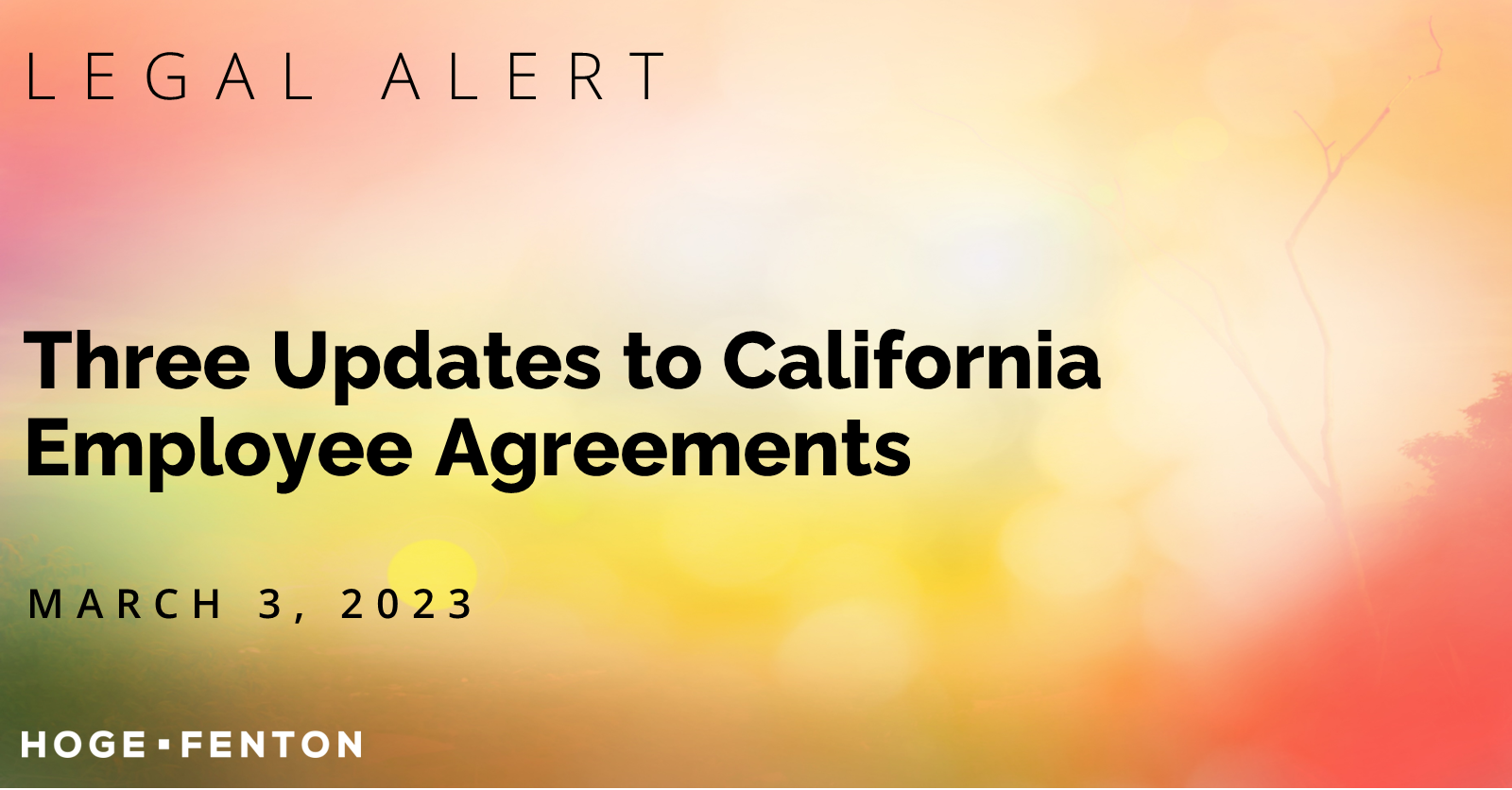Legal Alert: Three Updates to California Employee Agreements
By Sarju A. Naran, Jenn Protas, Rachel A. Garcia | 03.3.2023 | Employment Law
Legal Alert: Three Updates to California Employee Agreements
by Sarju Naran (he/him), Jenn Protas (she/her), and Rachel Garcia (she/her)
Three recent decisions have impacted California employee arbitration and severance agreements:
- Bonta: A rare win for California employers! Employers may require arbitration agreements be signed by employees as a condition of employment. (Chamber of Commerce of the U.S., et al. v. Bonta, et al. (9th Cir. Feb. 15, 2023, No. 20-15291) 2023 WL 2013326 (“Bonta”).)
- Galarsa: An employee who is required to arbitrate individual PAGA claims can still go to court after the arbitration is over to litigate representative PAGA claims. (Galarsa v. Dolgen California, LLC (Cal. Ct. App., Feb. 2, 2023, No. F082404) 2023 WL 2212196, as modified on denial of reh’g (Feb. 24, 2023) (“Galarsa”).)
- McLaren Macomb: Employers violate the National Labor Relations Act when offering employees an agreement (e.g., severance agreement) that includes broadly drafted non-disparagement and confidentiality provisions. (McLaren Macomb (2023) 372 NLRB No. 58 (“McLaren”).)
Summaries of the three rulings are below.
Bonta
If you’re experiencing whiplash from the constant switching of gears regarding whether you can mandate arbitration agreements, you aren’t alone. As of February 15, 2023, the Ninth Circuit Court of Appeals held that California Labor Code Section 432.6 prohibiting employers from requiring arbitration agreements as a condition of employment is preempted by the Federal Arbitration Act; as such, for now, employers may require arbitration agreements be signed by employees as a condition of employment. This is a rare win for employers in California, and the current state of the law, though we anticipate further appeal.
A roller coaster of procedural history leads up to this ruling. In 2019, California passed AB 51, creating Labor Code Section 432.6 and making it unlawful, as a condition of employment, continued employment, or the receipt of any employment-related benefit, for employers to require applicants or employees to waive any “right, forum, or procedure” for a violation of the Fair Employment and Housing Act and/or the California Labor Code. AB 51 also criminalized the formation of the contract, subjecting employers to potential criminal prosecution for requiring an employee to enter into an arbitration agreement, even if the resulting agreement could be enforced. Before AB 51 could take effect, on December 30, 2019, a Federal district court issued a temporary restraining order halting enforcement of the law temporarily, and, in January 2020, that court issued a preliminary injunction enjoining its enforcement. Up until the Ninth Circuit’s determination to the contrary in Chamber of Commerce of the U.S. v. Bonta, employers were still able to provide its employees with arbitration agreements. In September 2021, the Ninth Circuit ruled to uphold the California law, prohibiting employers from requiring employees to agree to arbitrate. However, in a surprising move, in 2022, the Ninth Circuit withdrew its 2021 decision, stating it would reconsider its ruling.
Now, after its withdrawal and reconsideration, the latest decision from the Ninth Circuit affirms a longstanding U.S. Supreme Court precedent (and similar rulings from other Circuit Courts of Appeal) finding state rules that otherwise burden or bar the formation of arbitration agreements conflict with legislative intent and are preempted by the Federal Arbitration Act. As a result, California employers remain able to require employees and applicants to sign arbitration agreements in connection with their employment without the risk of potential criminal liability. Employers should take this opportunity to review their arbitration agreements with counsel for compliance with applicable law. If employers do not yet utilize arbitration agreements, they should consult counsel regarding whether to do so. For an explanation of employment arbitration agreements and how they can be used to avoid class actions, see Hoge Fenton’s July 27, 2021 article here.
Galarsa
What the courts giveth, the courts taketh away. In June 2022, California employers cheered when the U.S. Supreme Court issued its ruling in the Viking River Cruises v. Moriana case, which decided that arbitration agreements could be used to stop employees from pursuing representative lawsuits on behalf of “other aggrieved employees” under the Private Attorneys General Act (“PAGA”), by requiring employees to only pursue their own individual claims—including individual claims under PAGA—in arbitration. However, as many employers feared might happen, on February 24, 2023, the California appellate court in Galarsa v. Dolgen California, LLC ruled that part of the U.S. Supreme Court’s ruling in Viking River Cruises was based on an incorrect interpretation of California state law, and an employee who is required to arbitrate individual PAGA claims can still go to court after the arbitration is over to litigate representative PAGA claims. There is a case pending before the California Supreme Court (Adolph v. Uber Technologies, Inc.), which is expected to decide whether arbitration agreements can be used to prevent employees from litigating representative PAGA claims. For now, arbitration agreements remain a powerful tool to avoid class action lawsuits, but they will not allow employers to avoid representative PAGA claims.
For an explanation of employment arbitration agreements and how they can be used to avoid class actions, see Hoge Fenton’s July 27, 2021 article here. For an explanation of PAGA lawsuits, see Hoge Fenton’s May 19, 2021 article here.
McLaren Macomb (NLRB)
On February 21, 2023, the National Labor Relations Board (“Board”) issued a decision in McLaren Macomb (2023) 372 NLRB No. 58, holding that employers violate the National Labor Relations Act (“NLRA”) when offering employees an agreement that includes broadly drafted non-disparagement and confidentiality provisions. The NLRA and the Board’s decision apply to both union and non-union employers. Specifically, the Board ruled that confidentiality and non-disparagement clauses in severance agreements violate Section 7 of the NLRA if they restrict workers from engaging in protected activity, including criticizing employer policies with coworkers and former coworkers, or discussing the terms of the agreement, labor issues, disputes, and other terms and conditions of employment. Because the decision is interpreting existing law, it applies to existing agreements and will apply to agreements going forward.
The McLaren case involved a hospital that laid off nearly a dozen employees as a result of the COVID-19 pandemic. As a part of the layoff, the hospital employer offered the employees a severance agreement that contained both a “Confidentiality Agreement” provision that barred the employee from disclosing the terms of the agreement to any third person (other than a spouse, lawyer, or tax advisor), as well as a “Non-Disclosure” provision that contained language barring the employee from making statements that “could disparage or harm the image of” the employer to the employer’s employees or the public. The Board found that these clauses were unlawful under the NLRA because the overbroad nature of the restrictions, as drafted, impacted employees’ abilities to exercise their Section 7 rights, including:
- Making statements asserting that the employer violated the law or disclosing the existence of an unlawful provision in the agreement itself;
- Filing charges with the Board regarding an employers’ unfair labor practices;
- Assisting a fellow employee with filing a charge with the Board;
- Cooperating with a Board investigation; and
- Engaging in otherwise protected activities, e.g., freely discussing any labor issues, disputes, or terms and conditions of employment.
The Board’s decision affects all employers, regardless of union affiliation. By contrast, the NLRA does not apply to supervisory employees. And though the Board’s decision specifically contemplates severance agreements, the Board’s reasoning creates a logical extension that could also reasonably be applied to settlement agreements or other similar agreements. Employers should take this opportunity to review all severance and settlement agreements with employment counsel to ensure compliance with this latest Board decision and other changes to the law.












